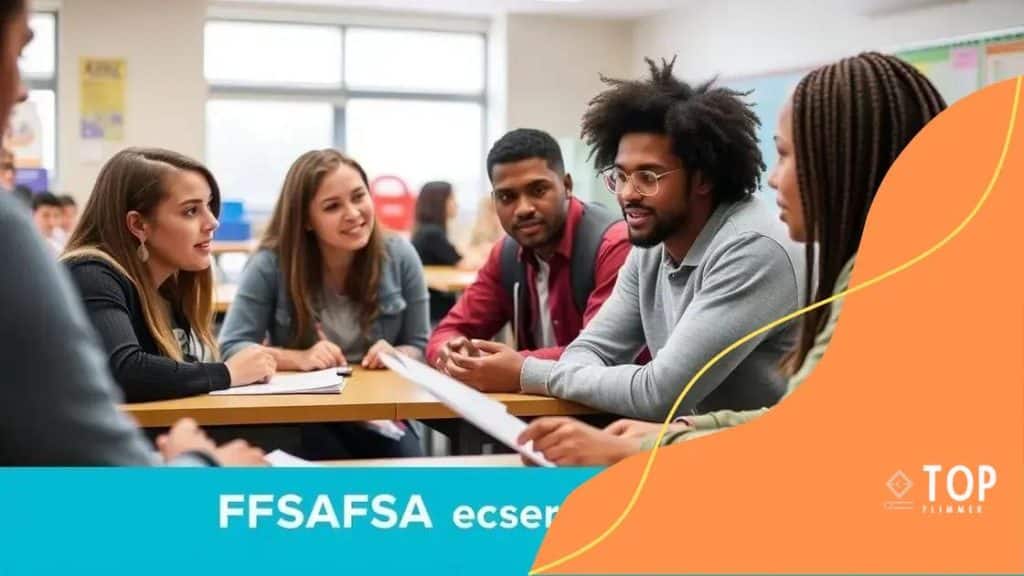FAFSA completion incentives for high school seniors

FAFSA completion incentives for high school seniors include access to federal financial aid, state scholarships, and college grants, making it crucial for securing funding for higher education.
FAFSA completion incentives for high school seniors are designed to help students access valuable financial aid. With the right guidance and knowledge, these incentives can significantly enhance your college funding options. Are you ready to explore what’s available?
Understanding FAFSA and its importance
Understanding the FAFSA is essential for high school seniors as it opens doors to federal financial aid for college. By filling out the FAFSA, students and their families can identify various forms of financial support, including grants, loans, and work-study opportunities. Knowing how FAFSA works can make a significant difference in funding your college education.
What is FAFSA?
The Free Application for Federal Student Aid (FAFSA) is a form that students fill out to apply for financial aid from the government. It determines the amount of aid a student qualifies for by evaluating their financial situation. Completing the FAFSA is a crucial step in the college admission process, and it’s essential to do it each year you plan to attend college.
Why is FAFSA Important?
Completing the FAFSA can significantly impact your educational journey. Here are some reasons why it’s important:
- Eligibility for federal student aid including grants.
- Access to state and institutional scholarships.
- Lower costs overall for your college education.
Moreover, many colleges require the FAFSA for their financial aid programs. If you miss the deadline or fail to submit it, you could potentially lose out on thousands of dollars in aid. Thus, understanding the importance of the FAFSA helps families make informed decisions about funding college.
Students often worry that filling out the FAFSA is complicated. However, there are online resources available to guide applicants through the process. Additionally, you can often find assistance from school counselors who can help demystify the form and answer your questions. Staying organized and starting early can alleviate much of the stress associated with FAFSA completion.
In summary, understanding the FAFSA allows students to navigate the financial aid system more effectively. By recognizing its importance, seniors can take proactive steps to secure funding for their college education.
Incentives available for FAFSA completion
Incentives available for FAFSA completion can make a big difference for high school seniors seeking financial aid. Understanding these incentives is crucial, as they provide additional motivation to complete the FAFSA on time.
Types of Incentives
Several incentives exist to encourage students to fill out the FAFSA. Here are some key types:
- Grants that do not need to be repaid, offering significant financial help.
- Scholarships from colleges and universities specifically for students who complete the FAFSA.
- Work-study programs that allow students to earn money while studying.
By taking advantage of these incentives, students can significantly reduce their college costs. Institutions often promote FAFSA completion by highlighting scholarship opportunities available only to those who apply.
State Incentives
Many states offer additional incentives for FAFSA completion. These can include:
- State-funded scholarships and grants.
- Priority consideration for state financial aid.
- Special financial aid workshops to assist students in the application process.
Additionally, some states even have deadlines that can impact eligibility for various aid options. By knowing the state-specific incentives, students can enhance their chances of receiving financial support. Some schools also host contests or giveaways for students who complete their FAFSA early, adding an exciting element to the application process.
In sum, recognizing the various incentives related to FAFSA completion is key for seniors. These incentives create opportunities that ease the burdens of college expenses and promote a smoother transition into higher education.
Impact of FAFSA on college funding

The impact of FAFSA on college funding is significant and can shape a student’s educational journey. By completing the FAFSA, students unlock access to various forms of financial assistance.
Federal Financial Aid
One of the major impacts of the FAFSA is eligibility for federal financial aid. This includes:
- Pell Grants: Need-based grants that do not have to be repaid.
- Direct Subsidized Loans: Low-interest loans for students with financial need.
- Direct Unsubsidized Loans: Loans available regardless of need, though interest accumulates.
With the right information provided on the FAFSA, students can maximize their federal aid package, which greatly alleviates the burden of tuition costs.
State and Institutional Aid
Filling out the FAFSA can also influence eligibility for state and institutional financial aid. Many states utilize FAFSA data to allocate their funds, meaning students who don’t apply may miss out on scholarships and grants from their home states. Moreover, various colleges and universities offer their own financial aid packages that are tied to FAFSA completion.
Additionally, some institutions provide scholarships specifically to students who file their FAFSA early or meet specific deadlines. Understanding this connection helps students plan their applications effectively.
The overall impact of the FAFSA on college funding cannot be overstated. Students who prioritize filling out the application are often better positioned to secure ample funding, resulting in less student loan debt and a smoother college experience.
Tips for completing the FAFSA successfully
Completing the FAFSA successfully is key to securing financial aid for college. With the right tips and preparation, students can navigate the process smoothly.
Start Early
One of the best tips for completing the FAFSA is to start the application early. This allows time to gather necessary documents such as:
- Tax returns from the previous year.
- W-2 forms and other income records.
- Bank statements and information on investments.
Beginning early helps ensure that you meet deadlines and reduces last-minute stress, allowing for a more thorough application.
Use the IRS Data Retrieval Tool
When filling out the FAFSA, utilizing the IRS Data Retrieval Tool can save time and help increase accuracy. This tool allows students and parents to pull income data directly from the IRS, reducing errors and the likelihood of being selected for verification.
Review Your Information Carefully
After completing the FAFSA, it’s crucial to review all entered information. Double-check details like Social Security numbers, names, and financial data. Errors in these areas can lead to delays or issues with financial aid.
Most students can access their FAFSA information online, allowing for quick revisions if necessary. Staying organized throughout the process is also important for a successful application.
Seek Assistance if Needed
If any part of the FAFSA process feels confusing, don’t hesitate to seek help. School counselors and financial aid offices are great resources that can provide guidance. There are also numerous online resources, including workshops and videos, that can clarify the steps to completing the FAFSA effectively.
In short, following these tips can greatly enhance the likelihood of successfully completing the FAFSA, paving the way toward valuable financial support for college.
Common mistakes to avoid when applying
When applying for the FAFSA, it’s important to avoid common mistakes that can jeopardize your financial aid opportunities. Understanding these pitfalls can help ensure a smoother application process.
Incorrect Information
One frequent mistake is providing incorrect information on the FAFSA. This can include errors in:
- Social Security numbers.
- Names or dates of birth.
- Financial information such as income and savings.
Mistakes like these can lead to delays in processing your application or even losing eligibility for financial aid.
Missing Deadlines
Another common error is missing deadlines. Each state and institution has specific deadlines for FAFSA submissions. Failing to submit your application on time can mean missing out on valuable financial aid opportunities.
Not Using the IRS Data Retrieval Tool
Many applicants overlook the benefits of the IRS Data Retrieval Tool when filling out the FAFSA. This tool allows you to import tax information directly from the IRS, which helps reduce errors and makes the process faster. Not using it can lead to inaccuracies and may require additional documentation later.
Assuming You Won’t Qualify
Some students mistakenly believe that they won’t qualify for aid, leading them to skip completing the FAFSA. It’s essential to realize that many types of aid are based on financial need, and filling out the application is critical. Every student should apply, regardless of their perceived financial situation.
Neglecting to Sign the Application
Finally, forgetting to sign the FAFSA can invalidate your application. Both the student and a parent must provide their signatures to complete the process. Always double-check that your application is fully signed before submitting.
By being aware of these common mistakes, you can enhance your chances of successfully completing the FAFSA and securing necessary financial aid for your college education.
Conclusion:
Completing the FAFSA can seem daunting, but understanding the key points can make the process easier. By avoiding common mistakes, utilizing helpful tools, and recognizing the incentives available, students can secure crucial financial aid for their college education. Starting early and asking for help when needed are essential steps for success. Every student should take the time to fill out the FAFSA, as it opens doors to valuable resources that can lead to a brighter future.
| Tip | Details |
|---|---|
| 🕒 Start Early | Beginning the FAFSA process early reduces stress. |
| ✅ Double-Check Info | Review all details to avoid mistakes. |
| 🔄 Use IRS Tool | Utilize the IRS Data Retrieval Tool for accurate info. |
| ❗ Ask for Help | Reach out to counselors or financial aid offices if needed. |
| 🎓 Apply Anyway | Always complete the FAFSA; you might qualify for aid! |
FAQ – Frequently Asked Questions about FAFSA Completion
What is the FAFSA and why is it important?
The FAFSA, or Free Application for Federal Student Aid, is a form that students fill out to apply for financial aid to help cover college costs. It is important because it determines eligibility for federal and state aid, scholarships, and loans.
When should I start filling out the FAFSA?
You should start filling out the FAFSA as early as possible. Many students begin in October when the application opens for the next school year. Early submission can enhance your chances of receiving financial aid.
Can I make mistakes on the FAFSA, and what are the common ones?
Yes, mistakes can be made on the FAFSA. Common mistakes include incorrect Social Security numbers, missing signatures, and providing inaccurate financial information. It’s essential to double-check your application before submission.
What documents do I need to complete the FAFSA?
Typically, you will need documents such as your tax returns, W-2 forms, bank statements, and information about investments. Having these ready will make the application process smoother.






